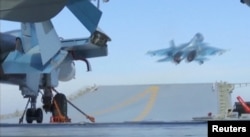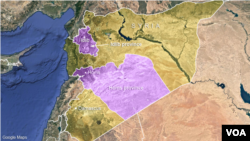Warplanes from Russia's lone aircraft carrier and a missile frigate struck targets in Syria on Tuesday, bombing areas southwest of the embattled city of Aleppo, as Syrian government aircraft renewed barrel bomb attacks on the city itself.
The first-ever Russian strikes from the Mediterranean-based carrier Admiral Kuznetsov were described by the Kremlin on Tuesday as targeting extremists in Idlib and Homs provinces.
The Russian Defense Ministry said a navy frigate also launched long-range cruise missiles at targets in northern Idlib — an area about 60 kilometers southeast of Aleppo.
However, the ministry insisted the Russian strikes were limited to Islamic State and other extremist targets, and ministry spokesman Igor Konashenkov rejected media reports alleging that Russian warplanes were involved in strikes on a hospital in Aleppo.
"Aircraft of the Russian Aerospace forces have delivered no airstrikes in Aleppo for the past 28 days," he said.
In Washington, the State Department blasted Moscow for the new attacks.
"We strongly condemn the resumption of airstrikes in Syria by the Russians," spokeswoman Elizabeth Trudeau said. She also accused Russia of blocking shipments of food and other aid to Aleppo during the bombing lull — a move she said led residents to "starve while [Moscow sought] praise from the international community for halting indiscriminate strikes."
Separately, Syrian news reports said government aircraft bombed "terrorist strongholds" in eastern Aleppo, a territory populated by as many as 300,000 civilians and rebel forces seeking to topple the government of President Bashar al-Assad.
Monitors from the Syrian Observatory for Human Rights said the strikes were the first to hit eastern Aleppo since October 18.
The renewed violence in Aleppo comes a day after U.S. President-elect Donald Trump spoke by telephone with Russian President Vladimir Putin — the Syrian government's strongest ally in the five-and-a-half-year civil war.
Putin said Monday that he and Trump agreed to "combine efforts to tackle international terrorism." However, it remains unclear whether the two governments can agree on a formula for easing the conflict, which the United Nations says has claimed more than 400,000 lives since 2011.
Moscow and Damascus categorize all rebels seeking to oust the Assad government as terrorists, a definition both governments use to justify the deadly and apparently indiscriminate bombings in eastern Aleppo.
Western governments and the United Nations have framed the Aleppo onslaught as a vast humanitarian crisis, with diplomats and human rights organizations arguing that both Damascus and Moscow could face future war crimes inquiries for their roles in the destruction of eastern Aleppo.










